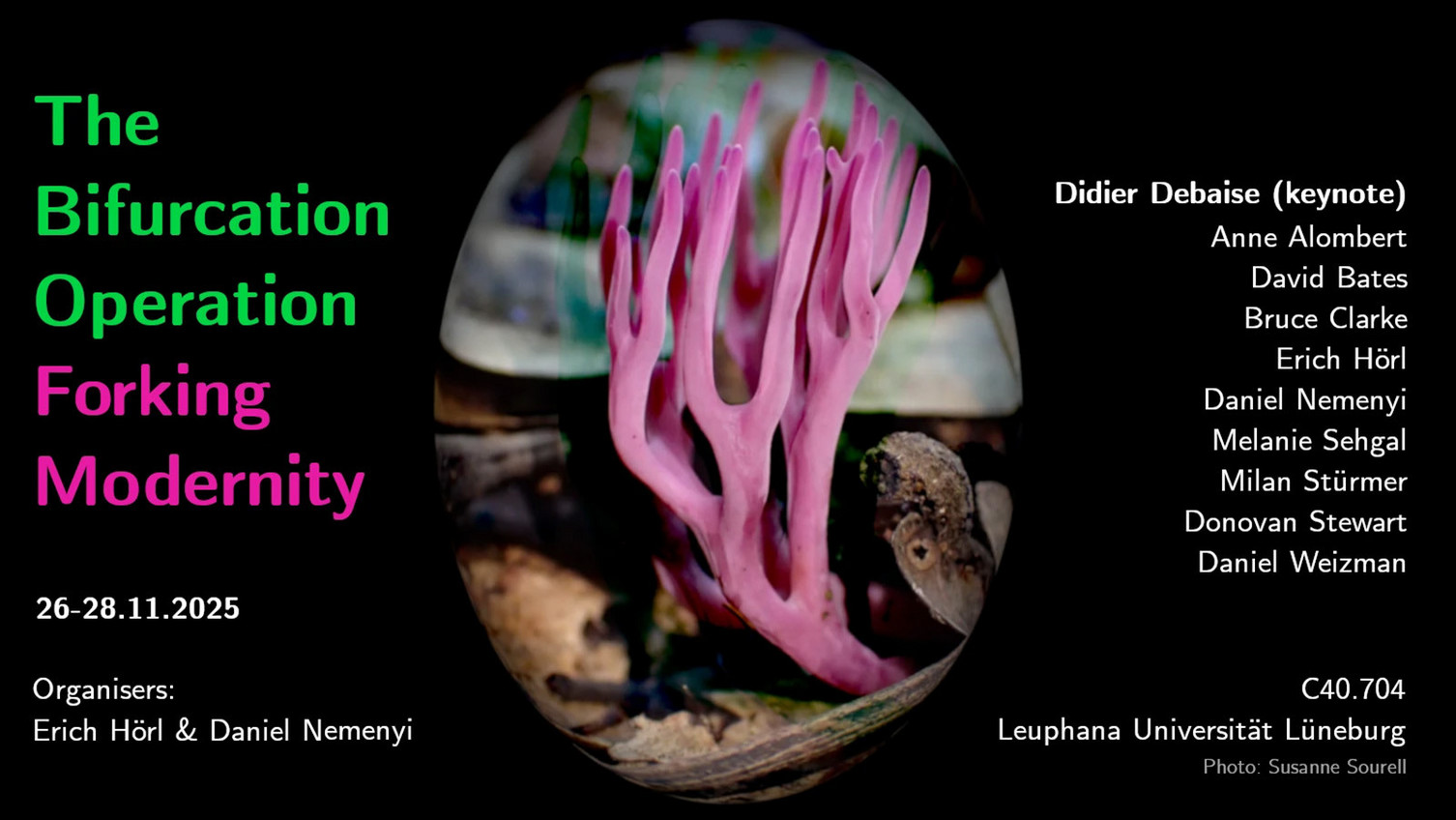Date: 26-28 November 2025
Venue: C40.704, Universitätsallee 1, 21335 Lüneburg
Keynote Speaker: Didier Debaise (Université Libre de Bruxelles)
Organised by: Erich Hörl und Daniel Nemenyi
Host: Research Initiative on the Disruptive Condition
In these gravely perilous times,
we must bifurcate: there is no alternative.
– Bernard Stiegler and the Internation Collective
We must avoid vicious bifurcation.
– Alfred North Whitehead
'Bifurcation', a word which originates in 19C mathematics, has emerged as a key term for thinking philosophically today's disruptive condition – but in ways that seem radically heterogeneous.
The career of Isabelle Stengers best exemplifies this. In her groundbreaking collaborations with Ilya Prigogine of the 1980s she stressed the essential randomness of a system's transition through successive critical points of 'bifurcation', and thereby the uncertainty and openness of evolution and historical time. Yet her work from the 2000s would reinvigorate precisely another sense of bifurcation: Alfred North Whitehead's extensive attack on modern philosophy's 'bifurcation of nature'. Whitehead argued that modern philosophy and science bifurcates nature into an objective reality available only through abstract and numerical reasoning, and a subjective, inferior reality experienced by the senses. Accordingly, Stengers argues: `Science becomes a predatory machine. It arms the institution against whatever it calls opinion.' Didier Debaise, our workshop's keynote speaker, continues that at stake in this is an 'operation' which involves the 'permanently repeated gesture of dividing bodies and their qualities.' The consequences of the bifurcation operation are wide ranging and real. To name but one: the privileging of minds over bodies, whose critique has been taken up after Whitehead by feminists including Maria Puig de la Bellacasa, Donna Haraway and others.
At the same time, Bernard Stiegler's restless demand for bifurcations, prior to his untimely death in 2020, involves yet another sense to the term. Stiegler calls for singular and improbable 'bifurcations', or forkings in directions that might establish new circuits of intergenerational transindividuation which break from the toxic effects of today's algorithmically automated society. He calls for such practical bifurcations prolifically but without offering a sustained philosophical explanation to ground them. Why does Stiegler lean on this, of all terms? How does his use relate to the senses already established by Stengers? Furthermore, how does his 'bifurcation' relate to those who he mentions in passing that he took inspiration from, and what do they bring in their own right? He names three: the self-deviating open systems of Ludwig von Bertalanffy (which were well known to Stengers and Prigogine), the topological Catastrophe Theory of René Thom (who clashed harshly with them), and the bifurcations of Jorge Luis Borges' multiversal detective story, 'The Garden of Forking [bifurcan] Paths', whose rich philosophical readings have involved concepts certainly dear to Stiegler himself, particularly by Jacques Derrida and Gilles Deleuze.
Are there paths, however forked, which lead between these various senses of bifurcation? The Bifurcation Operation: Forking Modernity shall host philosophical readings and interventions on the concept of bifurcation, considered with respect to its history and with respect to today's disruptive condition.
See the Programme (PDF) for abstracts and bios.
WEDNESDAY 26.11.25
18:00-18:30 / C40.704
Introduction: The Bifurcation Operation in Times of Disruption
Erich Hörl (Leuphana Universität Lüneburg)
18:30-19:45 / C40.704 / KEYNOTE LECTURE
The Gesture of Bifurcation: How did the Moderns Invent Themselves?
Didier Debaise (Université Libre de Bruxelles)
THURSDAY 27.11.25
10:15-11:30 / C40.704
Forking Hypermodernity: From Technological Singularity to Neganthropic Bifurcations
Anne Alombert (Université Paris 8)
11:45-13:00 / C40.704
A Decade of Bifurcation: Physical Perceptivity and the Principle of Solidarity
Milan Stürmer (Erasmus University Rotterdam)
14:15-15:30 / C40.704
Bifurcating Technics
Bruce Clarke (Texas Tech University)
15:45-17:00 / C40.704
Unlearning the Bifurcation of Nature
Melanie Sehgal (Bergische Universität Wuppertal)
FRIDAY 28.11.25
10:15-11:30 / C40.704
On the Catastrophic Origins of Reason
David Bates (UC Berkeley)
11:45-13:00 / C40.704
The Logic of Bifurcations: Gilles Deleuze Beyond Structuralism
Daniel Weizman (London School of Continental Philosophy)
14:15-15:30 / C40.704
There is no ‘The Incalculable’: Deconstruction and the Experience of Institution
Donovan Stewart (Leuphana Universität Lüneburg and Leiden University)
15:45-17:00 / C40.704
Cybernetics after Whitehead
Daniel Nemenyi (Leuphana Universität Lüneburg)
17:00-17:15 / C40.704
Closing remarks
The Bifurcation Operation: Forking Modernity will be an in-person only workshop taking place at Leuphana Universität Lüneburg, in Lüneburg, Lower Saxony, Germany.
We welcome attendees from within and beyond Leuphana University.
To register your attendance please contact Daniel Nemenyi: daniel.nemenyi@leuphana.de

